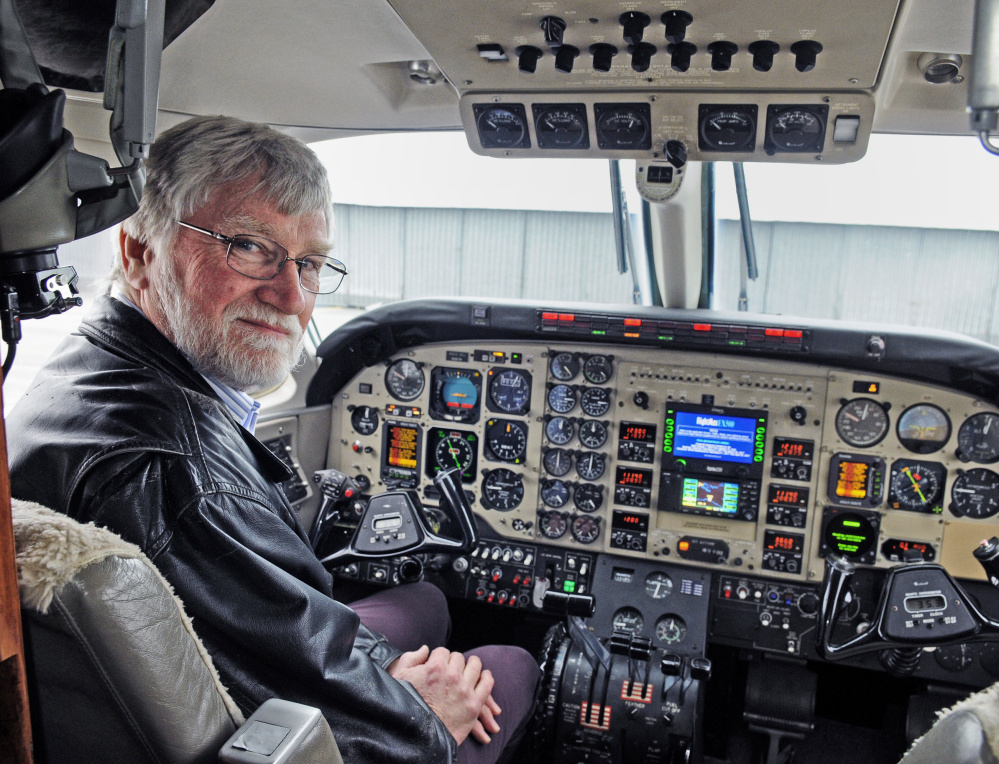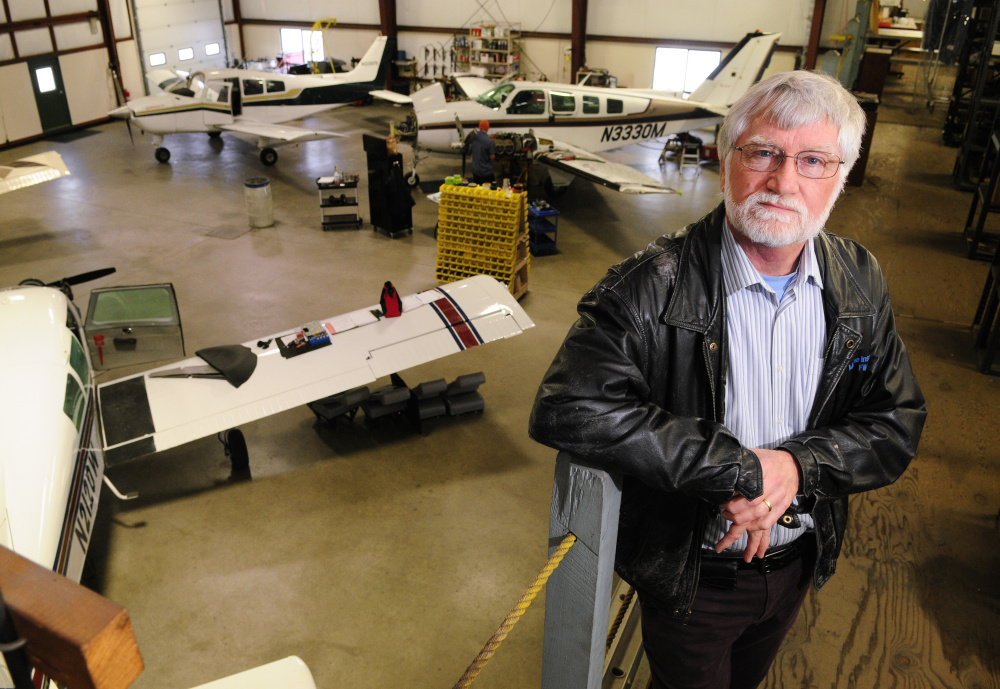AUGUSTA — David Smith has more than 26,000 hours of flight time in his 40 years as a pilot. But he says that’s not nearly enough.
Smith, 66, retired Dec. 31 as the chief pilot at Maine Instrument Flight at the Augusta State Airport. He spent the past four decades overseeing the company’s charter pilot operation, instructing pilots and serving as one of the chief charter pilots. He’s still a part-time employee and on-call pilot who flies a couple of times a week.
“I love flying, and it’s something you just can’t give up,” said Smith during an afternoon tour of the Augusta airport off Western Avenue. “It’s just like walking to me.”
He got his start almost by accident in 1970 while a student at the University of Maine at Augusta. He said he used to come to the airport with his roommate to hang out and relax and listen to the pilots and watch the planes.
Maine Instrument Flight’s founder, William L. Perry, used to conduct business in public view and would often receive suggestions from people, Smith said.
“One day I had the nerve to suggest something about advertising, I think, and the next week, I got my first paycheck,” he recalled.
During the next 40 years, Smith worked with experienced flight instructors and students hoping to become commercial pilots for either commuter or major airlines. He said the demographics of his students haven’t changed much in the past four decades.
“The students are definitely a little older than they used to be,” he said. “But we have people from all different walks of life, and there’s no real pattern that I can detect.”
It doesn’t necessarily take advanced understanding of computers or mathematics to be a successful pilot, Smith said. He said he’s not good at math, but he excels at spatial awareness, which has helped him throughout his career.
“What other people do with math and formulas, I can just picture, which I think is how most other pilots are, too,” he said. “We always know where we are in three dimensions.”
One thing about the industry that has changed, Smith said, is that the operation has had to become more cost-conscious in the past several years. When he first started, Smith said he could fly into just about any airport, borrow a car, go get lunch and bring it back with a full tank of gas before flying out.
“That doesn’t happen much anymore, and even the smaller airports, including this one in Augusta, charge fees to land,” he said. “There are still airports out there where you can fly in and get a comfortable, homey atmosphere, but you’ll have to do your research.”
Smith is designated by the Federal Aviation Administration to do check rides, which are essentially flight tests given to pilots every six months to make sure they are keeping up with their skills and knowledge. He said that despite the advance in technology and how computerized flying has become, there are still aspects about flying that are difficult to teach.
“Don’t crash,” he said. “But the hardest part to teach is to land the airplane. The pilot has to do that, and it’s just not that easy.”
FAA regulations and regulatory requirements placed on pilots and the aviation industry have become too oppressive, Smith said, and last summer he decided he just couldn’t deal with it anymore and didn’t have to.
“You don’t forget how to fly, but you still need to stay sharp and do continuing training,” he said. “The pilots came to me to develop more skills and experience, but they already knew how to fly, which made teaching them easier.”
Pilots in popular culture, especially in movies and on TV, are depicted as being larger-than-life figures with people following them through the airport or staring as they walk with flight attendants on either side. Smith said that was always overblown and joked that he never had women throwing themselves at him just because he was a pilot.
“But a pilot in uniform does have a presence,” he said. “It’s inspiring to everyone, but you have to work at it.”
Throughout his career, Smith has been to places all over the world and has fond memories of airports big and small, planes with one engine or two, a single propeller or a turboprop. His favorite airport is the one on Islesboro, where the owner of the airport’s Beechcraft King Air C90 has a home.
“It has a very, very short runway, so I love going in and out of there,” he said. “It’s quite the challenge.”
He also enjoys going to the airport in Halifax, Nova Scotia, and also mentioned Logan International Airport in Boston as a favorite.
Being a pilot hasn’t changed his experience when flying on a plane he isn’t in control of. He said he knows what’s going on all the time, so when he hears people on the plane talking and saying something, he has to tell himself not to interject.
“Though on occasion, I have helped people on planes who’ve gotten a little worked up,” he said. “I’ve helped calm people down.”
He has never had any dangerous situations during his career, but he admitted to having some flat tires and damaging part of the wings of an amphibious “flying boat” when flying to places “out in the boonies” because of the dense forests and trees and narrow landing areas. But he said there have never been any major problems.
Maine Instrument Flight, one of the oldest flight schools in the country, celebrated its 70th anniversary and opened a new state-of-the-art hangar last year. The partnership with UMA continues to meet the demand for trained pilots through a program where students can earn a bachelor of science in aviation.
UMA aviation students work with a world-class flight simulator on campus, and they also spend several hours completing real-world flight training. And if they are spending a lot of time at the Augusta State Airport, there’s a good chance they’ll see Smith when he’s not traveling with his wife as part of his retirement.
“It truly is a love,” he said with a wide grin as he climbed out of the captain’s seat of the King Air C90. “I just love to fly.”
Jason Pafundi can be contacted at 621-5663 or at:
jpafundi@centralmaine.com
Twitter: jasonpafundiKJ
Send questions/comments to the editors.





Success. Please wait for the page to reload. If the page does not reload within 5 seconds, please refresh the page.
Enter your email and password to access comments.
Hi, to comment on stories you must . This profile is in addition to your subscription and website login.
Already have a commenting profile? .
Invalid username/password.
Please check your email to confirm and complete your registration.
Only subscribers are eligible to post comments. Please subscribe or login first for digital access. Here’s why.
Use the form below to reset your password. When you've submitted your account email, we will send an email with a reset code.